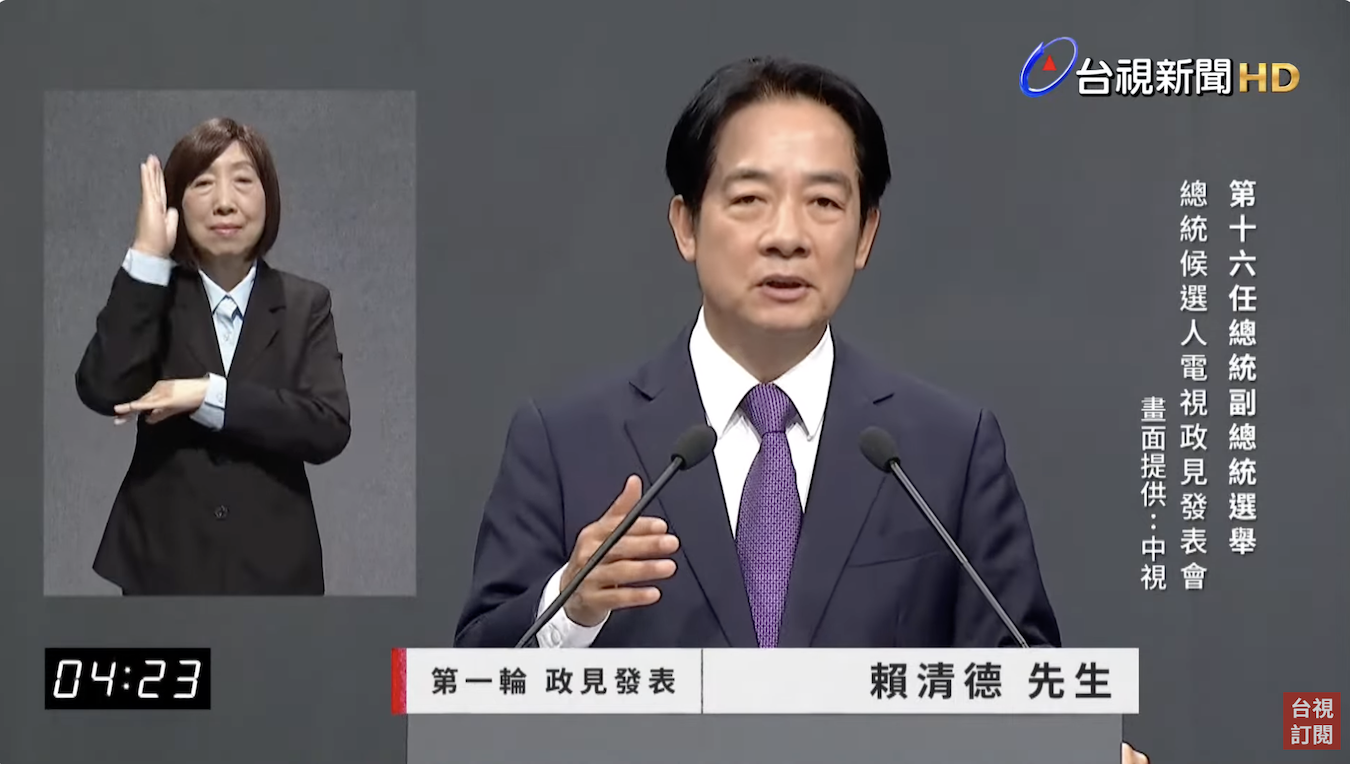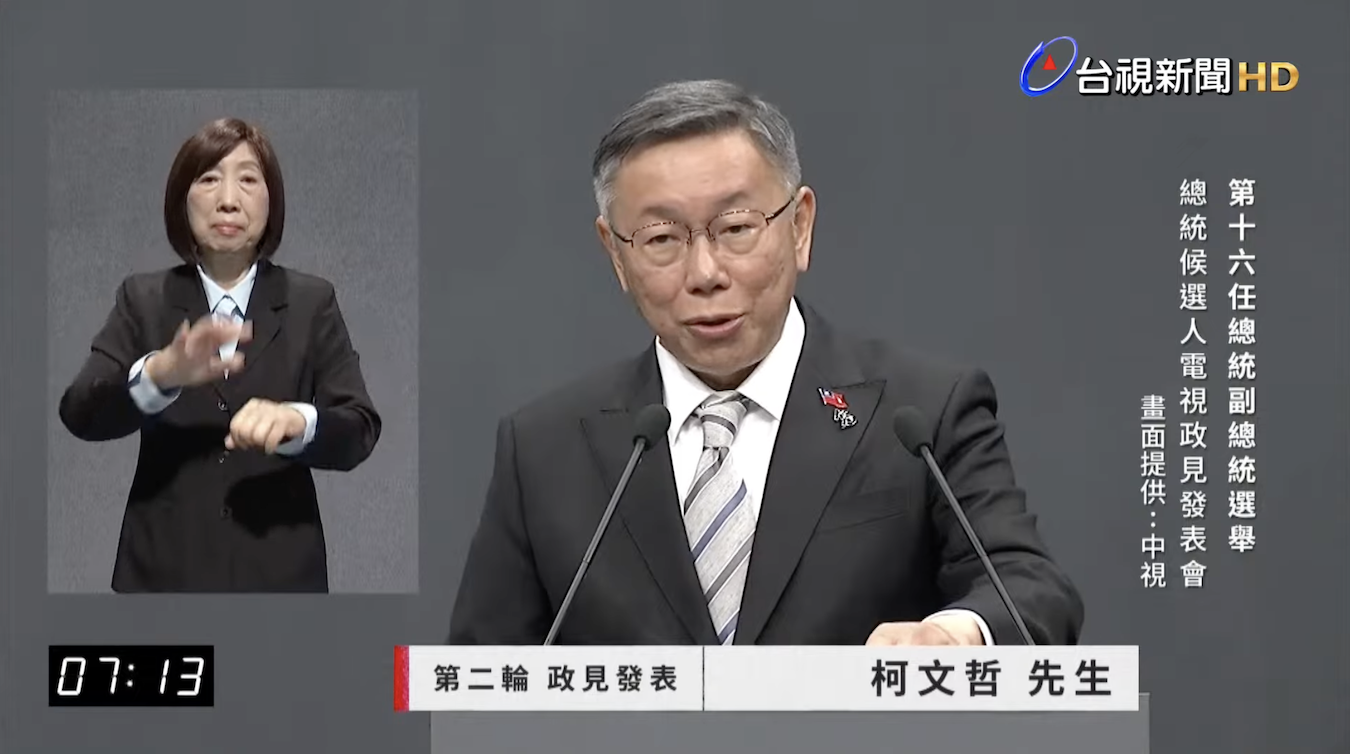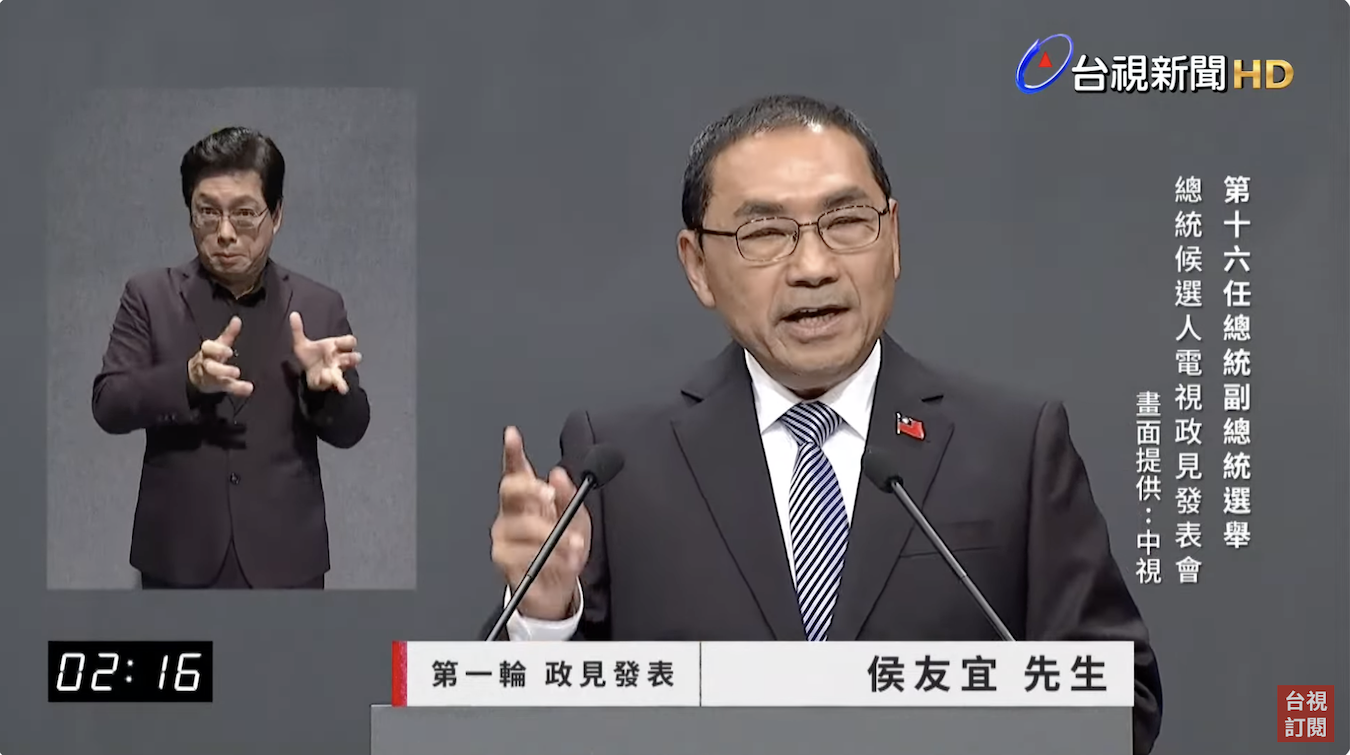by Brian Hioe
語言:
English
Photo Credit: TTV/Screenshot
THE SECOND PRESIDENTIAL policy presentation took place yesterday afternoon. Compared to the first presidential policy presentation, the exchanges between the candidates were less heated and mostly focused on domestic policy. As with the first presidential policy presentation, there were three rounds of exchanges.
First to speak was Ko Wen-je of the TPP. In the first round, Ko focused his comments in the first round of exchanges on education. Ko claimed that the issues regarding low salaries and lack of opportunities for employment in Taiwan reflect issues with Taiwan’s education system, in that the students that pass through the education system do not have the skills necessary to be hired. Ko promised to reform this, to stimulate fields such as athletics, to provide for sufficient staffing in Taiwan’s medical industry, and to cope with new challenges from AI. Ko also criticized the DPP’s educational policy, with regards to efforts to make Taiwan a bilingual country by 2030.
 Lai Ching-te. Photo credit: TTV/Screenshot
Lai Ching-te. Photo credit: TTV/Screenshot
Second to speak was Hou You-yi of the KMT. Hou focused on the issue of fraud in Taiwan. Hou criticized the Tsai administration and Lai’s role in it as having been unable to address issues of fraud facing Taiwan, suggesting that this showed how Lai was unfit for leadership. Hou then went on to criticize the Tsai administration on issues of social safety, stating that there were growing issues regarding drugs on school campuses, and dangers from how airsoft guns could easily be converted to actual firearms. Hou touted his own record fighting crime, whether as mayor or his previous career as a police official.
Lai Ching-te of the DPP was last to speak. Lai began by touting his recent tour around the country, stating that this was aimed at giving hope and showing a vision of social change to Taiwan as a whole. Over half of his comments in this round were devoted to anecdotes about campaigning. Subsequently, Lai promised to carry on Tsai Ing-wen’s vision of social change, to provide measures for the elderly and to allow young people to realize their dreams, including providing subsidies for students, tackling issues regarding housing justice, and building social housing.
 Ko Wen-je. Photo credit: TTV/Screenshot
Ko Wen-je. Photo credit: TTV/Screenshot
In the second round, Ko’s comments focused on Taiwan’s demographic woes, whether regarding the declining birthrate and rising elderly population. Ko stated that he would form a cross-ministerial task force to address the issue as president. Consequently, Ko called for providing the right social conditions that young people would be willing to have children, seeing as young people are not having children due to the inability to afford it, and promising to provide for the elderly rather than society being unable to provide for them.
By contrast, Hou focused fire on Lai’s record as mayor of Tainan, suggesting that Lai had been unable to resolve or even willing to confront social issues facing Tainan. This included what Hou framed as the pain of young people. Hou then went on to attack Lai on familiar issues alleging that he was ideologically dead set on promoting Taiwanese independence and moved onto economic and energy policy, stating that he would simplify the process for hiring migrant workers and that though he supported green energy, he did not support the DPP’s fixation on it.
In his comments, Lai stated that Taiwan was in a process of transition. Lai called for innovation in integrating digital technologies into everything from urban infrastructure to tourism. Lai emphasized the importance of the semiconductor industry, touted efforts to promote renewable energy transition to address climate change, and criticized the Ma administration on its record of energy management. Lai stated that renewable energy would be drawn from a number of sources.
In the last round, Ko honed in on the issue of low salaries in Taiwan, stating that this was the fault of the government. Ko also stated that Taiwan had issues with shortages, whether in terms of energy, water, or even toilet paper, suggesting this too was the result of mismanagement. Ko called for infrastructure development including reservoirs, and criticized the DPP for what he claimed were U-turns on nuclear energy policy. Ko criticized Hou You-yi for failing to push through on nuclear energy as mayor of New Taipei. In terms of migrant worker policy, Ko stated that he would push for migrant worker policy that supplemented rather than replaced Taiwanese labor and that the large number of undocumented migrant workers that have fled from their jobs indicates issues with migrant worker policy.
 Hou You-yi. Photo credit: TTV/Screenshot
Hou You-yi. Photo credit: TTV/Screenshot
Hou, too, sought to attack the DPP on energy policy. Hou criticized the DPP’s hesitancy on nuclear energy, while also suggesting mismanagement on the part of the Tsai administration. Hou stated that social inequality had increased in the last decade. As such, Hou stated that he would take measures to tackle social inequality. Hou also brought up the wave of #MeToo cases that faced the DPP earlier this year. Hou closed on the point of emphasizing his campaign’s educational measures and expressed respect for the women of Taiwan.
Finally, Lai began by citing high public approval of his mayorship of Tainan, to deflect criticisms by the other two candidates. Lai praised Tsai’s promotion of renewable energy, while criticizing the two pan-Blue candidates as using nuclear energy as a wedge issue to attack the DPP. Lai then pivoted toward cross-strait relations to criticize the KMT for its current pro-China stance, though this involved speaking of Chiang Ching-kuo in a strangely praising manner, including praising infrastructure development by Chiang and referring to Chiang in respectful terms on several occasions. Lai then criticized the KMT for internal corruption, as endangering Taiwan, over luxurious homes owned by KMT politicians, and how the KMT was fielding politicians with histories of sexual harassment. Furthermore, Lai criticized the KMT over the Lin Bay scandal, and as benefiting from Chinese attempts to undermine Taiwan’s democracy.
There were few surprises at the second policy presentation, then, with candidates generally agreeing on the domestic social issues that face Taiwan but the pan-Blue candidates attacking the Tsai administration’s record and Lai defending it. If cross-strait issues were not the focus of this policy presentation, one expects this to take greater precedence in the subsequent presidential debates.

